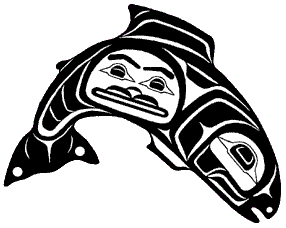

| Drawing by Ken Adkins |
Salmon nourish more than people. Nitrogen from their tissues, wasted after spawning, enhances the growth of plants, invertebrates and smolt (baby fish). Salmon is the mainstay in the diet of many large birds, bears, and river otters.
Native cultures regarded the salmon as having human characteristics and superhuman abilities. They believed that after dying, the "Salmon People's" spirits returned home to be reborn in human form. After a salmon feast, it was essential to return all of the salmon bones to the stream if the reborn human would be complete. If any of the salmon bones were missing, the new person would be missing those body parts. This would offend the Salmon People and they might refuse to return to the stream where they had been treated so poorly.
Long, long ago when animals and humans were the same and could still talk to one another, there lived the salmon people. There was also back in that time, another tribe who was short of food. They knew the salmon were good, but the salmon never came to their waters. Their chief decided to send out many people in canoes to find the salmon people and ask them to come to their land to give them sustenance. They traveled for many days and nights, finally coming to a new land of many rivers and tall trees.
The salmon people saw the strangers coming and told the chief of their approach. Just before the canoes landed on the beach, the chief directed four of the young people to go into the sea. As soon as the water reached their faces, they became salmon.
When it was time to welcome the strangers with a feast, the chief ordered some of his people to bring back the four fish they would find in the sea. These were then cleaned and roasted for the guests. The chief told them to eat all they wanted, but they could not throw away any of the bones. He told them to lay them aside carefully, to not destroy even a small bone.
The strangers feasted. When they had finished eating, some of the men from the salmon village carefully packed up the little piles of bones the guests had made, took them to the beach, and threw them into the sea. A few minutes later, the four young people who had gone into the water reappeared and joined the others.
They feasted for four days. One of the strangers was curious about why such care was taken with the salmon bones. After eating, he secretly held back some of the bones. As usual the rest of the bones were collected and taken back to the sea. Immediately afterward, the four young people came out of the water. One of the boys was covering his face and said, "Some of the bones are missing. I do not have any for my cheeks." One of the girls said that she was missing her chin. Alarmed by what he had done, the visiting tribal member brought out the bones he had kept back. The salmon youth returned to the water with the missing bones. When they returned, the cheeks and chin were back on their faces.
Now all the visitors were certain that their hosts were the salmon people. They asked the chief to let some of the salmon people visit their waters and come up their streams at mating time. The chief agreed as long as the tribe would agree to throw all the bones back so that the salmon people could return home after they visited them.